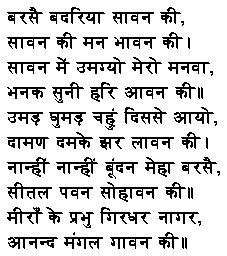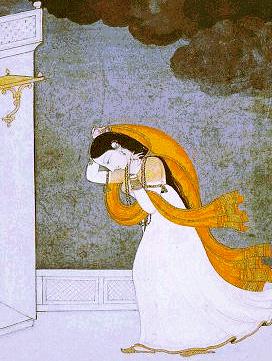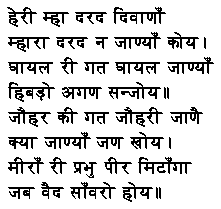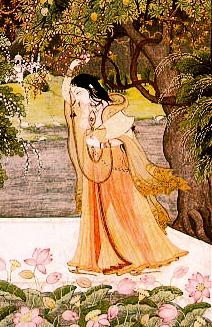Mira Bai
By
Sri Swami Sivananda

Mira is regarded as an incarnation of Radha. She was born in Samvat 1557 or 1499 A.D. in the village Kurkhi, near Merta, a small state in Marwar, Rajasthan. Mira was the daughter of Ratan Singh Ranthor and the grand-daughter of Dudaji of Merta. The Ranthors of Merta were great devotees of Vishnu. Mira Bai was brought up amidst Vaishnava influence, which moulded her life in the path of devotion towards Lord Krishna. She learnt to worship Sri Krishna from her childhood. When she was four years of age, she manifested religious tendencies. Once there was a marriage procession in front of her residence. The bridegroom was nicely dressed. Mira, who was only a child, saw the bridegroom and said to her mother innocently, "Dear mother, who is my bridegroom?". Mira's mother smiled, and half in jest and half in earnest, pointed towards the image of Sri Krishna and said, "My dear Mira, Lord Krishna—this beautiful image—is your bridegroom".
Child Mira began to love the idol of Krishna very much. She spent much of her time in bathing and dressing the image. She worshipped the image. She slept with the image. She danced about the image in ecstasy. She sang beautiful songs in front of the image. She used to talk to the idol.
Mira's father arranged for her marriage with Rana Kumbha of Chitore, in Mewar. Mira was a very dutiful wife. She obeyed her husband's commands implicitly. After her household duties were over, she would go to the temple of Lord Krishna, worship, sing and dance before the image daily. The little image would get up, embrace Mira, play on the flute and talk to her. Rana's mother and other ladies of the house did not like the ways of Mira, as they were worldly-minded and jealous. They were all annoyed with her. Mira's mother-in-law forced her to worship Durga and admonished her often. But Mira stood adamant. She said, "I have already given up my life to my beloved Lord Krishna". Mira's sister-in-law Udabai formed a conspiracy and began to defame the innocent Mira. She informed Rana Kumbha that Mira was in secret love with others, that she with her own eyes had witnessed Mira in the temple with her lovers, and that she would show him the persons if he would accompany her one night. She further added that Mira, by her conduct, had brought a great slur on the reputation of the Rana family of Chitore. Rana Kumbha was very much enraged. He straightaway ran with sword in hand towards the inner apartments of Mira. Fortunately, Mira was not in her room. A kind relative of the Rana checked him and said, "Look here Rana! Do not be in haste. You will repent later on. Consider well. Enquire into the matter very carefully. Find out the truth. Mira is a great devotional lady. What you have heard now may be a wild rumour only. Out of sheer jealousy some ladies might have concocted a cock-and-bull story against Mira to ruin her. Be cool now". Rana Kumbha agreed to the wise counsel of his relative. The Rana's sister took him to the temple at dead of night. Rana Kumbha broke open the door, rushed inside and found Mira alone in her ecstatic mood talking to the idol.
The Rana said to Mira, "Mira, with whom are you talking now? Show me this lover of yours". Mira replied, "There sits He—my Lord—the Nanichora who has stolen my heart". She fainted. There was a wild rumour that Mira was mixing very freely with Sadhus. She, no doubt, had great regard for Sadhus and mixed freely with them. Mira never cared a bit for the meaningless scandals. She stood unruffled.
Mira was persecuted in various ways by the Rana and his relatives. She got the same treatment which Prahlad got from his father Hiranyakasipu. Hari shielded Prahlad. Here, Sri Krishna always stood by the side of Mira. Once the Rana sent a cobra in a basket to Mira with the message that it contained a garland of flowers. Mira took her bath and sat for worship. After finishing her meditation, she opened the basket and found inside a lovely idol of Sri Krishna and a garland of flowers. Then the Rana sent her a cup of poison with the message that it was nectar. Mira offered it to Lord Krishna and took it as His Prasad. It was real nectar to her. Then the Rana sent a bed of nails for Mira to sleep on. Mira finished her worship and slept on the bed of nails. Lo! The bed of nails was transformed into a bed of roses.
When Mira was thus tortured by her husband's relatives, she sent a letter to Tulsidasji and asked the advice of the saint. She wrote thus: "All my relatives trouble me, because I move amongst Sadhus. I cannot carry on my devotional practices in the house. I have made Giridhar Gopal my friend from my very childhood. I am strongly attached to Him. I cannot break that attachment now".
Tulsidasji sent a reply: "Abandon those who do not worship Rama and Sita as if they are your enemies, even though they are your dearest relatives. Prahlad abandoned his father; Vibhishana left his brother Ravana; Bharata deserted his mother; Bali forsook even his Guru; the Gopis, the women of Vraja, disowned their husbands in order to attain the Lord. Their lives were all the happier for having done so. The opinion of holy saints is that the relation with God and love of God alone is true and eternal; all other relationships are unreal and temporary".
Once Akbar and his court musician Tansen came in disguise to Chitore to hear Mira's devotional and inspiring songs. Both entered the temple and listened to Mira's soul-stirring songs to their heart's content. Akbar was really moved. Before he departed, he touched the holy feet of Mira and placed a necklace of emeralds in front of the idol as a present. Somehow the news reached the Rana that Akbar had entered the temple in disguise, touched the feet of Mira and even presented her a necklace. The Rana became furious. He told Mira, "Drown yourself in the river and never show your face to the world in future. You have brought great disgrace on my family".
Mira obeyed the words of her husband. She proceeded to the river to drown herself. The names of the Lord "Govind, Giridhari, Gopal" were always on her lips. She sang and danced in ecstasy on her way to the river. When she raised her feet from the ground, a hand from behind grasped her. She turned behind and saw her beloved Krishna. She fainted. After a few minutes she opened her eyes. Lord Krishna smiled and spoke to her these words: "My dear Mira, your life with this mortal husband is over now. You are absolutely free. Be cheerful. You are Mine. Immediately proceed to the bowers of Vraja and the avenues of Brindavan. Seek Me there, my child. Be quick". He then disappeared.
Mira obeyed the divine call immediately. She walked barefoot on the hot sandy beds of Rajasthan. On her way, she was received by many ladies, children and devotees with great hospitality. She reached Brindavan. She found out her Flute-bearer there. She went about Brindavan begging for her food and worshipped in the Govinda Mandir which has since become famous and is now a place of pilgrimage. Her devotees of Chitore came to Brindavan to see Mira. Rana Kumbha came to Mira in the disguise of a mendicant, revealed himself and repented for his previous wrongs and cruel deeds. Mira at once prostrated before her husband.
Jiva Gosain was the head of the Vaishnavites in Brindavan. Mira wanted to have Darshan of Jiva Gosain. He declined to see her. He sent word to Mira that he would not allow any woman in his presence. Mira Bai retorted: "Everybody in Brindavan is a woman. Only Giridhar Gopal is Purusha. Today only I have come to know that there is another Purusha besides Krishna in Brindavan". Jiva Gosain was put to shame. He thought that Mira was a great devotional lady. He at once went to see Mira and paid her due respects.
Mira's fame spread far and wide. So many princesses and queens have come and gone. So many Ranis, Kumaris and Maharanis have appeared on the stage of this world and vanished. How is it that the queen of Chitore alone is still remembered? Is this on account of her beauty? Is this on account of her poetic skill? No. It is on account of her renunciation, one-pointed devotion to Lord Krishna and God-realisation. She came face to face with Krishna. She conversed with Krishna. She ate with Krishna—her Beloved. She drank the Krishna-prema-rasa. She has sung from the core of her heart the music of her soul, the music of her Beloved, her unique spiritual experiences. And she has sung songs of surrender and Prem.
Mira had the beautiful cosmic vision. She saw Krishna in the tree, in the stone, in the creeper, in the flower, in the bird, in all beings—in everything. As long as there is the name of Krishna, there will be the name of Mira also.
It is extremely difficult to find a parallel to this wonderful personality—Mira—a saint, a philosopher, a poet and a sage. She was a versatile genius and a magnanimous soul. Her life has a singular charm, with extraordinary beauty and marvel. She was a princess, but she abandoned the pleasures and luxuries incident to her high station, and chose instead, a life of poverty, austerity, Tyaga, Titiksha and Vairagya. Though she was a delicate young lady, she entered the perilous journey on the spiritual path amidst various difficulties. She underwent various ordeals with undaunted courage and intrepidity. She stood adamant in her resolve. She had a gigantic will.
Mira's songs infuse faith, courage, devotion and love of God in the minds of the readers. They inspire the aspirants to take to the path of devotion and they produce in them a marvellous thrill and a melting of the heart.
Mira's earthly life was full of troubles and difficulties. She was persecuted. She was tormented and yet she kept up an undaunted spirit and a balanced mind all through, by the strength of her devotion and the grace of her beloved Krishna. Though she was a princess, she begged alms and lived sometimes on water alone. She led a life of perfect renunciation and self-surrender.
Mira had Raganuga or Ragatmika Bhakti. She never cared for public criticism and the injunctions of the Shastras. She danced in the streets. She did no ritualistic worship. She had spontaneous love for Lord Krishna. She did not practise Sadhana-bhakti. From her very childhood she poured forth her love on Lord Krishna. Krishna was her husband, father, mother, friend, relative and Guru. Krishna was her Prananath. Mira had finished the preliminary modes of worship in her previous birth.
Mira was fearless in her nature, simple in her habits, joyous in her disposition, amiable in her deportment, graceful in her behaviour and elegant in her demeanour. She immersed herself in the love of Giridhar Gopal. The name of Giridhar Gopal was always on her lips. Even in her dreams, she lived and had her being in Sri Krishna.
In her divine intoxication, Mira danced in public places. She had no sex-idea. Her exalted state could not be adequately described in words. She was sunk in the ocean of Prem. She had no consciousness of her body and surroundings. Who could gauge the depth of her devotion? Who could understand her internal Premamaya state of Maha-bhava? Who could measure the capacity of her large heart?
Mira wafted the fragrance of devotion far and wide. Those who came in contact with her were affected by her strong current of Prem. Mira was like Lord Gauranga. She was an embodiment of love and innocence. Her heart was the temple of devotion. Her face was the lotus-flower of Prem. There was kindness in her look, love in her talk, joy in her discourses, power in her speech and fervour in her songs. What a marvellous lady! What a wonderful personality! What a charming figure!
Mira's mystic songs act as a soothing balm to the wounded hearts and tired nerves of those who toil in this world with the heavy burden of life. The sweet music of her songs exerts a benign influence on the hearers, removes discord and disharmony, and lulls them to sleep. Mira's language of love is so powerful that even a downright atheist will be moved by her devotional songs.
Mira acted her part well on the stage of the world. She taught the world the way to love God. She rowed her boat dexterously in a stormy sea of family troubles and difficulties and reached the other shore of supreme peace and absolute fearlessness—the kingdom of supreme love. She belonged to the gentle fair sex and yet how undaunted in spirit and how courageous she was! Though she was young, she bore the persecutions silently. She endured the piercing taunts and sarcastic criticisms of the world bravely. She has left an indelible impression on the world and her name will be handed down to posterity.
From Brindavan, Mira proceeded to Dwaraka. There she was absorbed in the image of Lord Krishna at the temple of Ranchod.


























